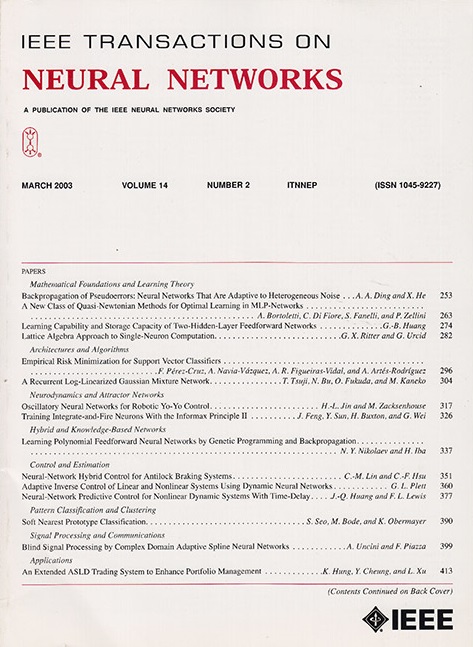基于并行学习的欠驱动机器人系统的自适应控制,保证驱动和非驱动运动的瞬态性能。
IF 10.2
1区 计算机科学
Q1 COMPUTER SCIENCE, ARTIFICIAL INTELLIGENCE
IEEE transactions on neural networks and learning systems
Pub Date : 2023-09-18
DOI:10.1109/TNNLS.2023.3311927
引用次数: 0
摘要
随着欠驱动机器人系统的广泛应用,对欠驱动机器人提出了更复杂的任务和更高的安全要求。然而,利用“更少”的控制输入来满足控制精度和瞬态性能,特别是对于未激活的变量,在理论和实践上都有保证,这仍然是一个悬而未决的问题。为此,对于欠驱动机器人系统,本文设计了一种自适应跟踪控制器,以实现指数收敛结果,而不仅仅是渐近稳定性或有界性;同时,未激活状态指数收敛到一个足够小的界,该界可以通过控制增益进行调整。所有变量的最大运动范围和收敛速度都表现出令人满意的性能,具有更高的安全性和效率。这里,提出了一种数据驱动的并行学习(CL)方法来补偿未知的动力学/扰动,并提高参数/权重的估计精度,而不需要激励或线性参数化(LP)条件的持久性。然后,利用扰动判断机制来消除外部扰动的有害影响。据我们所知,对于具有不确定性/扰动的一般欠驱动系统,首次从理论和实践上保证了非驱动状态的瞬态性能和指数收敛速度,同时获得了驱动运动的指数跟踪结果。理论分析和硬件实验结果均验证了所设计控制器的有效性。本文章由计算机程序翻译,如有差异,请以英文原文为准。
Concurrent Learning-Based Adaptive Control of Underactuated Robotic Systems With Guaranteed Transient Performance for Both Actuated and Unactuated Motions
With the wide applications of underactuated robotic systems, more complex tasks and higher safety demands are put forward. However, it is still an open issue to utilize “fewer” control inputs to satisfy control accuracy and transient performance with theoretical and practical guarantee, especially for unactuated variables. To this end, for underactuated robotic systems, this article designs an adaptive tracking controller to realize exponential convergence results, rather than only asymptotic stability or boundedness; meanwhile, unactuated states exponentially converge to a small enough bound, which is adjustable by control gains. The maximum motion ranges and convergence speed of all variables both exhibit satisfactory performance with higher safety and efficiency. Here, a data-driven concurrent learning (CL) method is proposed to compensate for unknown dynamics/disturbances and improve the estimate accuracy of parameters/weights, without the need for persistency of excitation or linear parametrization (LP) conditions. Then, a disturbance judgment mechanism is utilized to eliminate the detrimental impacts of external disturbances. As far as we know, for general underactuated systems with uncertainties/disturbances, it is the first time to theoretically and practically ensure transient performance and exponential convergence speed for unactuated states, and simultaneously obtain the exponential tracking result of actuated motions. Both theoretical analysis and hardware experiment results illustrate the effectiveness of the designed controller.
求助全文
通过发布文献求助,成功后即可免费获取论文全文。
去求助
来源期刊

IEEE transactions on neural networks and learning systems
COMPUTER SCIENCE, ARTIFICIAL INTELLIGENCE-COMPUTER SCIENCE, HARDWARE & ARCHITECTURE
CiteScore
23.80
自引率
9.60%
发文量
2102
审稿时长
3-8 weeks
期刊介绍:
The focus of IEEE Transactions on Neural Networks and Learning Systems is to present scholarly articles discussing the theory, design, and applications of neural networks as well as other learning systems. The journal primarily highlights technical and scientific research in this domain.
 求助内容:
求助内容: 应助结果提醒方式:
应助结果提醒方式:


